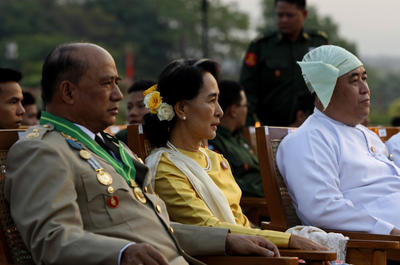Myanmar remains a young country: the median age in 2010 was 28 years, with an estimated 25 per cent of the population under the age of 30. Figures released by the Ministry of Foreign Affairs also indicate that 9 million of the total population of 52.4 million people are between 15 and 24. This is a formidable proportion of the politically aware public.
Aung San Suu Kyi claims to appreciate the importance of the youth in instigating political change, having previously argued that ‘young people [were] at the vanguard of the Tunisian Revolution’. Yet, in the context of Myanmar, she has failed to account for the youth in her conception of a democratic revolution. Her party is still clogged with old men.
The word on the streets of Yangon suggests that she does not have the unwavering support that some might assume. When asked about the politician, responses from young voters commonly begin with: ‘I have so much respect for her, but …’, ‘she is an incredible person, but …’, ‘she has done amazing things, but …’ Reverence for her as a person and for her achievements flow. But there is scepticism and even anger at her current behaviour. Responses will conclude with statements such as: ‘I do not think she is a good leader for the future’ and ‘she has become a politician and is acting too strategically, not in our best interests’.
So what has Aung San Suu Kyi said about young people in Myanmar?
Her strategy seems to be to align herself with the voting public by relating to their repression. This approach overlooks the considerable differences between the plights of distinct groups of the population and tends to ignore the burgeoning cultural scene and political will of the youth.
At an International Labour Organization conference in Geneva in June 2012, Aung San Suu Kyi declared that it is ‘not so much joblessness as hopelessness that threatens our future. Unemployed youth lose confidence in the society that has failed to give them the chance to realize their potential’. In an interview in September 2012 she went on to say that ‘young people who are ill-educated, in ill health, who have lost hope, are a danger to the country’.
But what of the youth who are not ill educated or hopeless?
The National League for Democracy (NLD), Aung San Suu Kyi’s current party, lost a number of its younger members in the 2010 election, when many resigned from the party due to disagreements about its administration. Following these resignations, many young people chose to participate in the electoral process independently of the NLD. Rather than support them, Aung San Suu Kyi and the NLD undermined their decision to work within the constraints of the country’s political system by boycotting the elections entirely. This approach now smacks of inconsistency, in light of her recent entrance into parliament and her political engagement with the military-aligned government.
Aung San Suu Kyi’s statements of late have also been purposefully vague, avoiding contentious issues, most prominently on the Rohingya conflict. This extends to her stance on youth involvement in politics. At the Columbia World Leaders Forum, when asked whether she would take young people’s political efforts seriously, she replied: ‘if you believe in the cause to which we are working, no age is right’. Politically vague statements such as this hint at deeper issues in the NLD, and raise serious questions about what Aung San Suu Kyi and her party stand for.
Uncertainty over what she stands for, mistrust of her motivations and disapproval of her stance — or lack thereof — on the treatment of Myanmar’s minorities is alienating the country’s youth. Accordingly, young people have joined the ranks of those disenchanted by Aung San Suu Kyi’s new role as a politician. They recognise her distance from their reality: ‘she is out of touch with us, travelling around the world collecting awards’, or at the extreme: ‘she has lost it, she is bad, being friends with the military and not us’.
Aung San Suu Kyi is in an undeniably difficult position. The public’s infinite expectations and her limited political power will not deliver her an easy win in the upcoming elections. But one thing is clear: the NLD is not a youthful party, and for all her speeches about their importance in the country’s future, Aung San Suu Kyi does not have the youth vote.
Jacqueline Menager is a PhD candidate at the College of Asia and the Pacific, the Australian National University.

